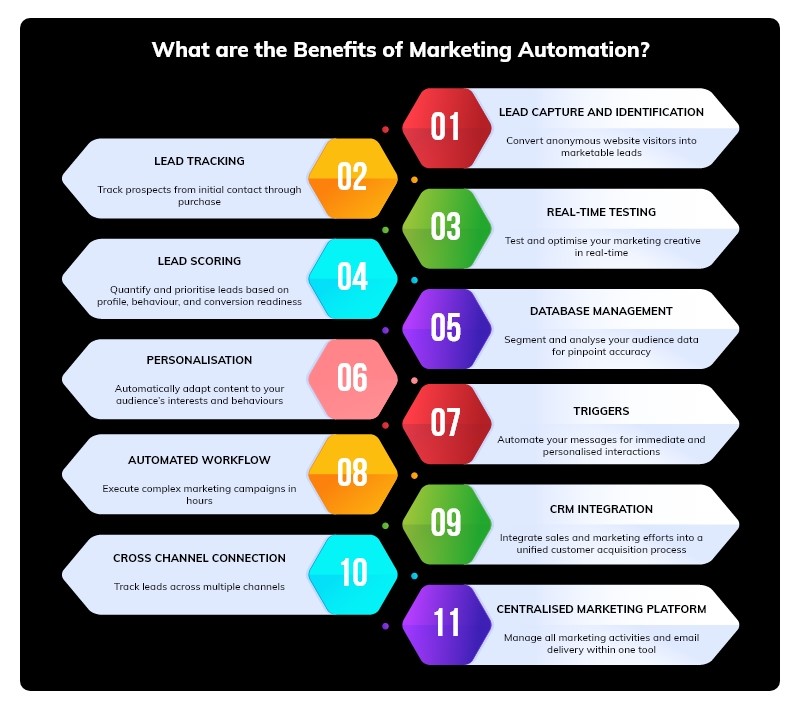
Marketing Automation: Top 7 Use Cases in Marketing that will take your business to new levels: –
Artificial Intelligence (AI) and Robotic Process Automation (RPA) are the buzzwords that attract the interest of business leaders in today’s rapidly advancing world. Forrester predicts that the RPA industry will expand to a whopping $22 billion by the year 2025.
According to a study conducted by Gartner, approximately 80% of finance leaders have either already implemented or are considering implementing RPA. Similarly, a different study done by Forrester shows that 57% of workers believe that RPA helps in decreasing manual errors.
When people typically think about marketing, they often associate it with clever and strategic campaigns and persuasive advertisements. However, there is more to this profession than just creating innovative and memorable marketing strategies. Technology has been particularly beneficial for marketing teams as it enables them to avoid tedious and repetitive tasks, allowing them to accomplish more with fewer efforts.
In English, you have the ability to automate email campaigns, produce reports, and handle communications across various channels. Afterward, you can generate reports, collect data, analyse your metrics, and compare them with information from other departments to discover ways to enhance the effectiveness of marketing strategies.
What does the term Robotic Process Automation (RPA)?
Straight from Gartner’s Glossary, Robotic process automation (RPA) is a tool that helps increase productivity by enabling a user to set up scripts, also known as “bots,” to automatically perform specific actions using keystrokes. These bots can imitate or replicate various tasks within a business or IT process, such as manipulating data, transferring information between applications, initiating responses, or carrying out transactions. RPA utilizes a combination of user interface interaction and descriptor technologies, and the scripts can work alongside multiple software applications.
Now, we will examine the leading eight instances of using RPA in the field of marketing.
Collecting information from multiple sources and in different formats poses a significant difficulty for marketers when dealing with multiple portfolios of items, and relying on manual procedures may lead to failure.
What occurs when employee tiredness or lack of interest inhibits the gathering of data? Two instances are the creation of duplicate files, particularly in Excel, and the loss of data as it can be stored in multiple locations. This is why data management is considered a critical use case of RPA in marketing.
You have the option to utilize RPA in order to adjust the frequency of displaying ads according to customer preferences. RPA can assist you in appropriately timing the ads and modifying bids depending on their effectiveness. This guarantees that you maximize your ad spending and attain a high marketing return on investment.
You have the ability to set a specific schedule for your ads in Google Ads. This means you can choose when your ads are displayed and optimize your bidding strategy to increase bids when your target audience is most likely to make a purchase. For instance, if you notice that your conversions are highest during weekends, it would be wise to plan larger bids during those times.
While SEO reporting plays a vital role in enhancing the visibility of your website and resources, it can cause a great deal of stress for the marketing team, particularly when they have to manually create, review, and distribute the reports.
By utilizing automation to generate SEO reports, you can guarantee seamless integration of data from multiple sources, correct preparation of reports, and prompt identification of any errors. Additionally, RPA can enhance reports by including personal information, uploading them to different platforms, and continuously examining them for optimal results.
With the increasing complexity and duration of the buyer decision process, RPA allows organizations to efficiently identify and cultivate leads without requiring large amounts of resources and time. By automating a substantial portion of the lead nurturing procedure, teams can concentrate on crucial interactions that ultimately turn potential customers into loyal purchasers.
For example, marketers have the ability to utilize RPA to establish standards for identifying leads that are worth pursuing, streamline the process of assessing leads, and concentrate their efforts on potential customers who offer high value. Additionally, they can take advantage of automated campaigns to enhance precision and excellence, direct their efforts towards the most relevant audience, and offer personalized experiences that are highly tailored to their needs, thereby providing increased benefits for their business.
Monitoring trends and uncovering valuable insights on social media is undeniably crucial. This practice can greatly amplify the effectiveness of your business’s content and spur engagement during relevant current events, helping you avoid any missed opportunities.
Nevertheless, the constant growth of available information on social media poses challenges for marketers in performing their tasks. To address this issue, the utilization of robotic process automation in marketing can alleviate the burden of repetitive tasks and enhance productivity.
Conversational marketing plays a significant role in both B2B and B2C marketing strategies. Combining artificial intelligence-powered chatbots with RPA technology can be highly effective in converting website visitors. When a visitor seeks certain information to aid in their decision-making process, the integrated RPA Bot can quickly retrieve the requested information from various backend systems and databases, making it accessible to the visitor.
By implementing RPA bots, you can allocate additional time to grow your sales pipeline and interact with your clients. This allows you to concentrate on cultivating potential leads while automating monotonous duties.
Imagine having to input data from an outdated CRM system into a more modern system by hand. You realize that this process will take a lot of time and there is also a high likelihood of making mistakes. This realization makes you feel frustrated and eager to find a better solution. That is where RPA solutions come in. With the help of software robots, the data can be migrated from the old system to the new one seamlessly and swiftly, ensuring that the findings are accurate and reliable, without causing any disruption to your business.
Microsoft Power Automate is a rendition of RPA that mainly makes use of automated workflows to accomplish the said repetitious tasks.
How are these workflows created? With the help of what the platform term “connectors”. With their help, you can build simple to more complex workflows that will get single or multiple tasks done – and with ready integration compatibility.
These cloud-based integrations can be related to mitigating the risks of data and identity management services, for example. In fact, the platform as a whole is designed for a more full-scale integration into comprehensive collections of services.
More importantly, Power Automate for RPA is also largely AI-based, which paves the way for more customized and agile solutions. All the while, it’s made with ease of use in mind, especially for business owners who prefer automation solutions that are less technical than most.
Aptly put, since it’s a workflow-based automation platform, Power Automate delivers its solutions through what it terms automation Flows. Technically, Flows fuse both UI- and API-based automation into one. They can be subcategorized into the following:
You set a specific time when a scheduled process will be triggered in order to fulfill a certain task.
These Flows automate all repetitive desktop and web-based processes. These provide suitable automation workarounds for tasks such as transferring files, extracting text, or getting data from spreadsheets.
These can be either straightforward or more complex processes. You can create different stages in the business process with each stage having up to 30 steps. Regardless of your purpose for using these kinds of Flows, what’s important is for them to be used to guide the user from beginning to end to complete a task – without having to undergo additional training for it.
Cloud Flows rely largely on API connectors and can be triggered by certain events like receiving an email or acquiring a notification. This is where the platform’s AI aspect is concentrated, as evidenced by the AI Builder feature. Simply put, AI Builder extends Power Automate’s capabilities to include optical character recognition, image recognition, form processing, and even language comprehension.
Below is a brief list of the potential achievements that can be obtained through the utilization of marketing automation, particularly when implemented by a skilled team who has expertise in this robust technology.

Every business is unique and has its own marketing needs. Automation is also highly adaptable; you can create customised dashboards, email templates, and more.
HOW CAN Spaculus SOLUTIONS HELP YOU WITH POWER AUTOMATE & RPA?
We are experts in providing results-driven Microsoft solutions centering on automation. Power Automate is but one platform that we have mastered and continue to master over time.
We prioritize customized, optimal, and future-proof solutions that will be able to deliver your exact goals and for your enterprise to enjoy most if not all the perks of Power Automate mentioned here. Schedule a free consultation.
RPA Insights and Applications